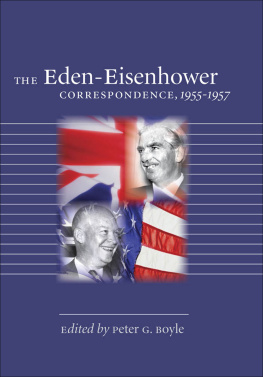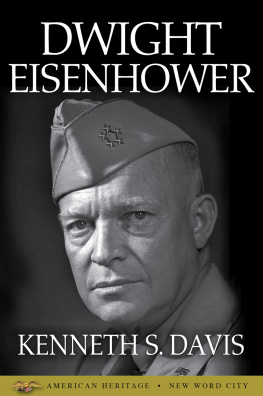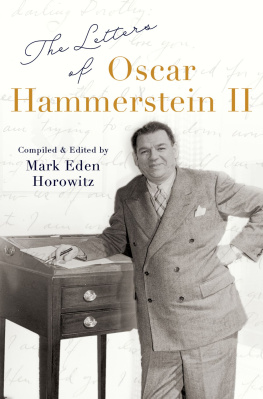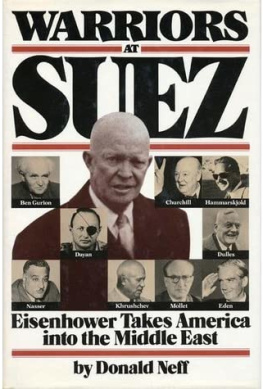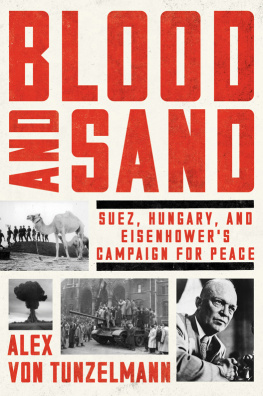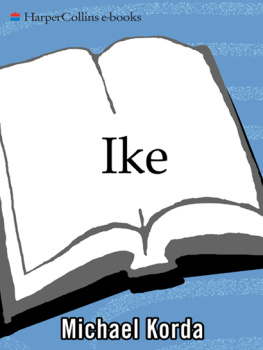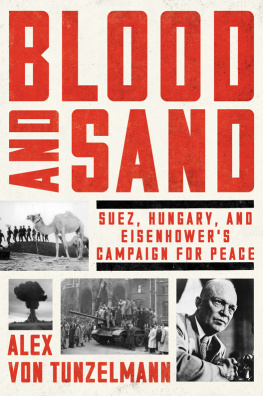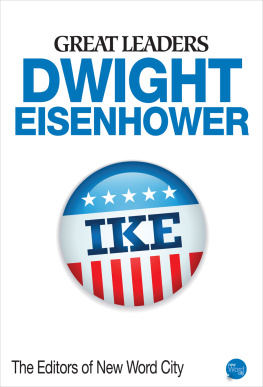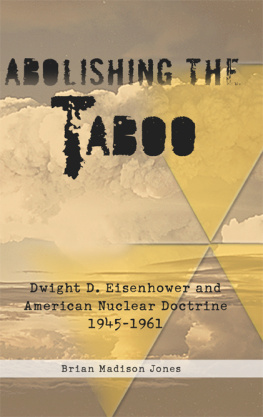The EDEN-EISENHOWER Correspondence, 19551957
2005
The University of North Carolina Press
All rights reserved
Designed by Richard Hendel
Set in Scala by Keystone Typesetting, Inc.
Manufactured in the United States of America
The paper in this book meets the guidelines for permanence and durability of the Committee on Production Guidelines for Book Longevity of the Council on Library Resources.
Library of Congress Cataloging-in-Publication Data
Eden, Anthony, Earl of Avon, 1897
The Eden-Eisenhower correspondence, 19551957 / edited by
Peter G. Boyle.
p. cm.
Includes bibliographical references and index.
ISBN 0-8078-2935-8 (cloth: alk. paper)
1. Eden, Anthony, Earl of Avon, 1897Correspondence.
2. Eisenhower, Dwight D. (Dwight David), 18901969
Correspondence. 3. Great BritainForeign relationsUnited
States. 4. United StatesForeign relationsGreat Britain.
5. Prime ministersGreat BritainCorrespondence. 6. United
StatesForeign relations1953-1961. 7. PresidentsUnited
StatesCorrespondence. 8. Great BritainForeign relations
1945- I. Eisenhower, Dwight D. (Dwight David), 1890-1969.
II. Boyle, Peter G. III. Title.
DA566.9.E28A4 2005
327.4107309045dc22 2004027158
09 08 07 06 05 5 4 3 2 1
CONTENTS
- A section of illustrations follows page
ACKNOWLEDGMENTS
I am grateful to John S. D. Eisenhower for permission to publish the letters of his father, President Dwight D. Eisenhower. The letters of Prime Minister Anthony Eden to President Eisenhower in the Prime Ministers Papers in the Public Record Office in the National Archives in Kew, Surrey, are Crown copyright, which, thanks to recent liberalization of access to information, no longer requires formal permission for reprinting material. I am grateful to Lady Avon for permission to conduct research in the Papers of Lord Avon (Anthony Eden) in the Special Collections of the University of Birmingham Library and to quote briefly from these papers.
I am obliged to the British Academy for a research grant in 2003 and to the University of Nottingham for a sabbatical semester in 2003.
I am grateful to my editor, Charles Grench, senior editor at the University of North Carolina Press. I am also grateful to his predecessor, Lewis Bate-man, who first suggested to me the idea of an edition of The Churchill-Eisenhower Correspondence, 19531955 and who encouraged me to follow this up with an edition of The Eden-Eisenhower Correspondence, 19551957. I am grateful to the archivists in the Dwight D. Eisenhower Library, especially David Haight, the archivists in the Special Collections of the University of Birmingham Library, especially Chris Penney, and the archivists in the Public Record Office in the National Archives in Kew.
I am very grateful to Christine Worthington for assistance in editing and for typing the manuscript.
I am very appreciative of the assistance of three of my colleagues at the University of Nottingham, Robert Frazier, Spencer Mawby, and John Young, who read the entire manuscript and made useful suggestions for improvements. I am likewise very obliged to the two anonymous University of North Carolina Press readers for very helpful suggestions for improvements.
With regard to a number of matters I am grateful to Richard Aldrich, Angela Chandler, Oliver Daddow, Hugh Goddard, Rhodri Jeffreys-Jones, Paul Lashmar, Scott Lucas, Ann McQueen, Ritchie Ovendale, Ian Scott, Helen Taylor, Stephen Twigge, and Laura Wurzal.
Assistance from many quarters has saved me from many mistakes. For those which remain I take full responsibility.
ABBREVIATIONS
Text
AIOCAnglo-Iranian Oil CompanyClarissaClarissa EdenFosterJohn Foster DullesHaroldHarold MacmillanMamieMamie EisenhowerNATONorth Atlantic Treaty OrganizationNuriNuri al-SaidOSSOffice of Strategic ServicesRAFRoyal Air ForceSACEURSupreme Allied Commander, Europe (commander of NATO forces)SCUASuez Canal Users AssociationSelwynSelwyn LloydWinthropWinthrop Aldrich
Notes
APPapers of the Earl of Avon (Anthony Eden), Special Collections, University of Birmingham Library, Birmingham, EnglandAWFAnn Whitman File, Dwight D. Eisenhower Library, Abilene, Kans.DDELDwight D. Eisenhower Library, Abilene, Kans.FOForeign Office
FPUSForeign Relations of the United States, 19551957 (Washington, D.C.: U.S. Government Printing Office, 19851993).NSCNational Security Council
PPPublic Papers of the Presidents: Dwight D. Eisenhower, 19531961, 8 vols. (Washington, D.C.: U.S. Government Printing Office, 19581961).PREMPremier (Prime Minister)PROPublic Record Office, National Archives, Kew, Surrey
INTRODUCTION
There is no one better fitted than you to seize the opportunities inherent in your new office for helping to guide the world towards the goal we all earnestly seek. On the more personal side, I cannot tell you how delighted I am that my old friend Winston has been succeeded by an equally valued friend in an office in which friendliness and genuine readiness to cooperate can mean so much to my own country. In these words in the first letter of his personal correspondence with Anthony Eden on April 8, 1955, President Dwight D. Eisenhower warmly welcomed Eden's appointment as prime minister of Britain. Eisenhower concluded his letter with an expression of my confident belief in the brilliant career ahead of you. Eighteen months later, however, the relationship had degenerated into the deception and disagreements over Suez, which culminated in Eden's resignation in January 1957. The Anglo-American relationship during the Eden-Eisenhower years, 195557, is, therefore, a dramatic tale of initial high hopes and promising potential, which ended in tears and in ashes. The development of the relationship from its early promise to its final collapse is vividly revealed in the personal correspondence between Eden and Eisenhower during the period when they were simultaneously in office, April 6, 1955, to January 9, 1957.
The tradition of personal correspondence between the prime minister of Britain and the president of the United States was begun by Winston Churchill and Franklin Roosevelt during World War II.1 In 1952, following Eisenhower's election as president, Churchill, who had become prime minister of Britain again in 1951, suggested to Eisenhower that they should engage in a similar personal correspondence in addition to normal government-to-government exchanges. Eisenhower agreed to the suggestion and throughout the period when they were simultaneously in office as prime minister of Britain and president of the United States, from January 20, 1953, to April 5, 1955, Churchill and Eisenhower engaged in a correspondence in which letters were less frequent than between Churchill and Roosevelt but were generally longer and more reflective.2 Eden was keen to continue this tradition and to have a similar correspondence with Eisenhower. On April 11, 1955, he wrote to Eisenhower, thanking him for his complimentary comments and adding, I hope that you will allow me from time to time to address you where there is some particular aspect of a problem which I would like to present to you and that you won't hesitate to tell me of any reflections or criticisms you may have. The Eden-Eisenhower correspondence thereby duly commenced and continued on a regular basis, with occasional lapses, until the end of Eden's premiership.
Eden, a well-educated diplomat, was, of course, very experienced in the art of letter writing and in expressing himself in a lucid, fluent fashion. Eisenhower was in his way also an experienced and gifted letter writer. As a soldier who was frequently away from home, writing and receiving letters was an important part of his life. He was of a generation to whom the writing of letters was one of the social graces to be acquired as well as a form of communication. Indeed, by contrast to e-mail and the coarser forms of instant communication of later times, the correspondence between Eden and Eisenhower raises a yearning for a lost art and a gentler, more courteous means of interchange of views and ideas.

